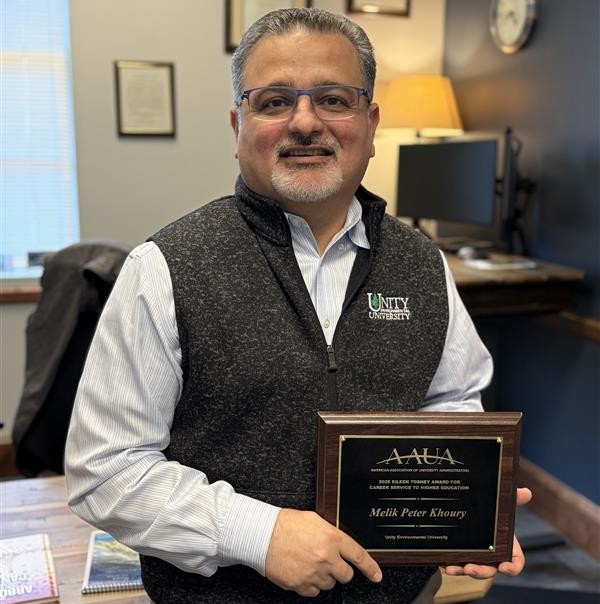Unity College students already get the experiences they need to be successful outside of school every day — but what if they actually lived what they’ll do in life after college? Recent changes at America’s Environmental College will now allow just that, through an innovative new “Enterprise Education” approach that changes how higher educational institutions generate revenue, subsidize tuition costs, and prepare graduates for real-world application of their skills.
After two years and a substantial investment from an anonymous donor, Unity College recently completed a strategic branding initiative, colloquially known as the “Deep Dive,” researching and identifying several often contradictory forces at work in higher education. For example: the need for colleges to increase revenue seems to run counter to students’ need to keep college costs down, and counter to employers’ desires for new employees who are well prepared and ready to focus on work — not debt.
As part of the Deep Dive, Unity College asked a lot of what if’s and why not’s. What if the college created revenue-generating and not-for-profit ventures where our students, faculty, and staff could do the work of teaching and learning in the very places where the learning will need to be applied? And what if the revenue they generated through learning helped defray tuition costs?
What if Unity College ran an outdoor adventure center or a zoo? A farm-to-table restaurant? A research laboratory? What if we leveraged our faculty capacity for professional practice and academic research to meet growing student learning needs?
Why wouldn’t we? What if we did? What if?
After years of research into the latest learning and student development theory, the receipt of the results from all facets of the Deep Dive, and conversations with consultants and college accrediting agency, New England Association Schools and Colleges, Unity College has decided that there is no reason why not. No reason at all.
These new potential ventures, referred to as Strategic Education Business Units (SEBUs), will open doors for students, staff, and faculty alike, allowing more real-world experiences within the college safety net and learning network while helping hold tuition increases in check. This new model of Enterprise Education will be a further real life manifestation of Unity College’s dedication to experiential learning.
“While Unity College in Maine will remain home base, a host of other locations will be actively targeted, including partnerships with community colleges and other institutions, making Unity more inclusive, accessible and available,” Unity College President Dr. Melik Peter Khoury said. “This unique and disruptive strategy addresses all forces: those of the college, the student and the marketplace. That is what will differentiate us. We are fully supporting the residential campus, but we are also freeing ourselves to bring Unity College to other locations in Maine, the country, and, hopefully, the world.”
Unity College’s new Enterprise Education approach allows the college to have multiple revenue generating arms, offering the opportunity for students to learn beyond traditional coursework as they play active roles in managing businesses and NGOs through the school’s SEBUs. Instead of a sustainable agriculture program having a demonstration plot just outside the classroom, Unity College is asking, “Why not just have our students help run a farm?”
An actual farm. McKay Farm. A farm that could grow student jobs and produce. A farm that raises greens as well as revenue. Why wouldn’t we?
Two years of research has proven there is no market, learning, service, or mission reason not to involve students in the development and management of real-life enterprises. There is no reason not to engage students in development and management of social enterprises, business enterprises, revenue-generating enterprises, and not-for-profit enterprises. There is no reason not to follow through on our what if’s.
The Distance Education program at Unity College, experiencing early success since its launch last October, is now officially the first of what could, potentially, be many SEBUs in the not-so-distant future. To facilitate the creation of SEBUs, Unity College’s board of trustees recently voted to restructure their committees, adjust the role of the President, revise its bylaws to create a more nimble organization, and align with the Association of Governing Board’s latest recommendations. Starting in 2012, if not earlier, the board has made a series of decisions based on the recognition that in order for Unity to thrive, being nimble as an organization was critical to long-term success.
“Changes to the organizational structure and associated system of governance at Unity College will build on the school’s current momentum and promote a more agile organization, guided by innovative leadership to ensure a sustainable institution with financial and cultural vitality,” Board Chair John Newlin said. “The ‘industry’ of higher education has become a complex survival maze. At Unity, we have been fortunate to see increased enrollment, and a solid financial base for the moment. However, complacency is not our friend. We must be able to be more nimble.”
According to Deep Dive research conducted by marketing firms Now What, Epic Decade, Stamats, and Brand Alchemy, current U.S. college students highly value co-ops, internships, and work experience. That should come as no surprise — at Unity, we know firsthand that many learn best by doing and, although the conversation continues about exactly what “learning by doing” means, experts agree that applying knowledge helps us learn and retain that knowledge. A 2015 study in Psychological Science found that learning by doing helps students perform better in science. More generally, the Non-Destructive Testing Resource Center, a National Science Foundation supported initiative, reports that the only learning activity with better information retention than “Practice by doing,” at 75 percent retention, is “Teach others / immediate use of learning,” which shows a 90 percent information retention percentage. By comparison, lecture-based learning shows merely 5 percent retention.
While the breadth and stakes of the questions inherent in this shift might worry other colleges, President Khoury strongly believes that Unity College is intrepid. America’s Environmental College is now at the forefront of reimagining the relationship between the classroom, the teacher, and the material.
“It is common practice these days to see organizations, corporations, and companies with an educational arm. So is it so far-fetched to believe that an educational facility can have an enterprise arm?” President Khoury said. “We know that 90% of employers are dissatisfied with college graduate readiness. In order to maintain our relevance, small, private higher education institutions must become more responsive to society and industry needs”
“This approach of merging theory and application into sustainable business enterprises will ensure the relevancy of our students both for graduate school and employment directly after graduation.”
“Now the real work begins,” concluded President Khoury.



